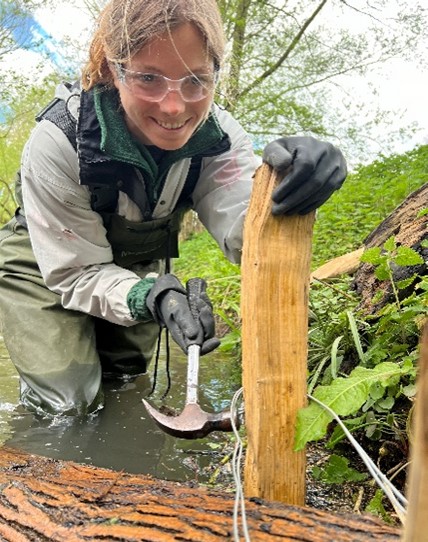Lucy Hutchison (nee Stott) (Water and Environmental Management, MSc)
The MSc Water and Environmental Management provided the perfect balance of academic depth and real-world application by engaging with professors and professionals from across the freshwater industry, preparing me more thoroughly than any graduate scheme could have.

How did your degree support you in securing your job role following your studies?
The MSc Water and Environmental Management programme at Queen Mary was fundamental in helping me secure my current position as Evidence Project Officer at Thames21. My new role involves collaborating with professional and non-professional stakeholders to monitor pollution and implement nature-based water quality remediation measures. Our first assignment involved applying for a hypothetical environmental role, and one year later, I was hired for that very role, thanks to the preparation delivered by the programme.

What skills did you develop through your degree?
I gained practical and analytical skills from designing flood inundation models with industry-standard software, analysing geomorphological changes on ArcGIS, designing a consultancy-style urban river restoration plan, preparing a site investigation report for a historic landfill, using SPSS for correlation, regression and multivariate analysis across environmental settings, and conducting field experiments and lab analysis.
What was your research project about, and how did it help you in securing a job?
My research project on road runoff pollution, carried out in collaboration with Thames21, provided invaluable experience in validating their new predictive model for highly polluting areas and mitigation strategies. This project not only strengthened my data analysis and technical expertise but also gave me a standout example to present during my job interview. I am excited to continue working on this model in my work as it is expanded across the nation.
What other benefits did your degree offer?
Beyond academic knowledge and technical skills, the programme emphasised networking and professional development. We were encouraged to attend external events, seminars and activities hosted by organisations like the British Hydrological Society, London Freshwater Group, Water Conservators and volunteer groups.
These opportunities broadened my understanding of the water industry and improved my communication skills and experience in both professional and non-professional settings. I believe these skills will benefit me when working on projects such as SYMBIOREM, where I will communicate with a range of stakeholders across London and Europe.
What did you enjoy most about the programme?
The programme provided the perfect balance of academic depth and real-world application with engagement with professors and professionals from across the freshwater industry, preparing me more thoroughly than any graduate scheme could have. I’m excited to continue applying these skills in my new role at Thames21 and to pursue a career where I am making a positive impact on the freshwater environment.